Related Research Articles

John William Coltrane was an American jazz saxophonist, bandleader and composer. He is among the most influential and acclaimed figures in the history of jazz and 20th-century music.
Modal jazz is jazz that makes use of musical modes, often modulating among them to accompany the chords instead of relying on one tonal center used across the piece. Although precedents exist, modal jazz was crystallized as a theory by composer George Russell in his 1953 book Lydian Chromatic Concept of Tonal Organization.

Eric Allan Dolphy Jr. was an American jazz multi-instrumentalist and bandleader. Primarily an alto saxophonist, bass clarinetist, and flautist, Dolphy was one of several multi-instrumentalists to gain prominence during the same era. His use of the bass clarinet helped to establish the unconventional instrument within jazz. Dolphy extended the vocabulary and boundaries of the alto saxophone, and was among the earliest significant jazz flute soloists.

Elvin Ray Jones was an American jazz drummer of the post-bop era.
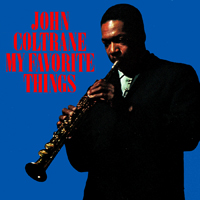
My Favorite Things is the seventh studio album by jazz musician John Coltrane, released in March 1961 on Atlantic Records. It was the first album to feature Coltrane playing soprano saxophone. An edited version of the title track became a hit single that gained popularity in 1961 on radio. The record became a major commercial success.

Coltrane "Live" at the Village Vanguard is a live album by jazz musician John Coltrane, released in February 1962 on Impulse Records. It is the first album to feature the members of the classic quartet of Coltrane with McCoy Tyner, Jimmy Garrison, and Elvin Jones, as well as the first Coltrane live album to be issued. In contrast to his previous album for Impulse!, this one generated much turmoil among both critics and audience alike with its challenging music.
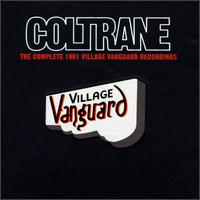
The Complete 1961 Village Vanguard Recordings is a box set of recordings by jazz musician John Coltrane, issued posthumously in 1997 by Impulse! Records, catalogue IMPD4-232. It collects all existing recordings from performances by the John Coltrane Quintet at the Village Vanguard in early November, 1961. Five selections had been issued during Coltrane's lifetime on the albums Live! at the Village Vanguard and Impressions. Additional tracks had been issued posthumously on the albums The Other Village Vanguard Tapes, Trane's Modes and From the Original Master Tapes.
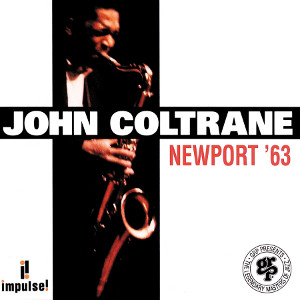
Newport '63 is a live album by jazz musician John Coltrane recorded at the 1963 Newport Jazz Festival, with one additional track recorded at the Village Vanguard in 1961. The album features the Coltrane quartet with drummer Roy Haynes substituting for Elvin Jones.
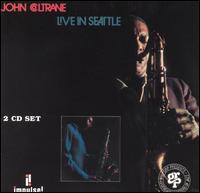
Live in Seattle is a live double album by jazz saxophonist John Coltrane, recorded in 1965 and released posthumously in 1971 on the Impulse! label. The album consists of a set played by Coltrane's quartet at The Penthouse on September 30, 1965. Along with the later-released A Love Supreme: Live in Seattle, recorded two days later at the same club, they are the only officially released live recordings of Coltrane's six-piece lineup from late 1965. The original double LP issue was expanded to 2 CDs for the reissue.

Live in Antibes is a live album by jazz musician John Coltrane that was released in 1988 on the France's Concert label.

To the Beat of a Different Drum is a double album by jazz musician John Coltrane released posthumously in 1978. It is a compilation of recordings in which Roy Haynes replaced Coltrane's regular drummer Elvin Jones.
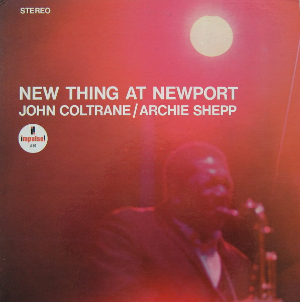
New Thing at Newport is a 1965 live album featuring two separate sets from that year's Newport Jazz Festival by tenor saxophonists John Coltrane and Archie Shepp. It was recorded four days after the recording session for Coltrane's album Ascension, on which Shepp appeared, and is one of several albums documenting the end stages of Coltrane's "classic quartet," which would begin to break up by the end of that year with the departure of McCoy Tyner.

Selflessness Featuring My Favorite Things is a posthumous album by jazz musician John Coltrane, released in 1969. The album juxtaposes two tracks recorded live at the 1963 Newport Jazz Festival with a single track ("Selflessness") recorded in a studio in Los Angeles in 1965.

1958 Miles is a compilation album by American jazz musician Miles Davis, released in 1974 on CBS/Sony. Recording sessions for tracks that appear on the album took place on May 26, 1958, at Columbia's 30th Street Studio and September 9, 1958, at the Plaza Hotel in New York City. 1958 Miles consists of three songs featured on side two of the LP album Jazz Track, which was released in November 1959, one song from the same session not appearing in the album, and three recordings from Davis' live performance at the Plaza Hotel with his ensemble sextet. The recording date at 30th Street Studio served as the first documented session to feature pianist Bill Evans performing in Davis' group.
In the late 1960s, Latin jazz, combining rhythms from African and Latin American countries, often played on instruments such as conga, timbale, güiro, and claves, with jazz and classical harmonies played on typical jazz instruments broke through. There are two main varieties: Afro-Cuban jazz was played in the US right after the bebop period, while Brazilian jazz became more popular in the 1960s. Afro-Cuban jazz began as a movement in the mid-1950s as bebop musicians such as Dizzy Gillespie and Billy Taylor started Afro-Cuban bands influenced by such Cuban and Puerto Rican musicians as Xavier Cugat, Tito Puente, and Arturo Sandoval. Brazilian jazz such as bossa nova is derived from samba, with influences from jazz and other 20th-century classical and popular music styles. Bossa is generally moderately paced, with melodies sung in Portuguese or English. The style was pioneered by Brazilians João Gilberto and Antônio Carlos Jobim. The related term jazz-samba describes an adaptation of bossa nova compositions to the jazz idiom by American performers such as Stan Getz and Charlie Byrd.

The Best of John Coltrane is a 1970 compilation album released by Atlantic Records collecting recordings made by jazz saxophonist John Coltrane. The album was released shortly after his death as a part of the "Atlantic Jazz Anthology"—a series of greatest hits compilations for Atlantic jazz artists—and features performances from his brief period recording for Atlantic with new liner notes by jazz journalist Nat Hentoff.

My Favorite Things: Coltrane at Newport is a compilation album by jazz musician John Coltrane released by Impulse! in 2007. It brings together tracks from performances by Coltrane's quartet at the Newport Jazz Festival in Newport, Rhode Island on July 7, 1963, and July 2, 1965.

Dear Old Stockholm is a compilation album by jazz musician John Coltrane released by GRP and Impulse! in 1993. The music, which was recorded on April 29, 1963 and May 26, 1965 at Van Gelder Studio in Englewood Cliffs, NJ, features Coltrane's quartet with Roy Haynes substituting for Elvin Jones on drums.
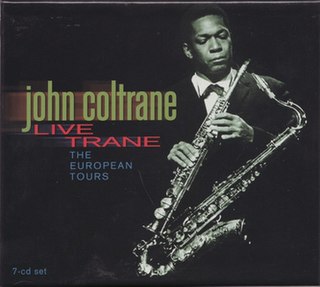
Live Trane: The European Tours is a 7–CD compilation album by American saxophonist John Coltrane containing music recorded live during 1961, 1962, and 1963 European tours, all of which took place under the auspices of Norman Granz's Jazz at the Philharmonic programs. The album, which was released in 2001 by Pablo Records, features Coltrane on tenor and soprano saxophones along with pianist McCoy Tyner, bassists Jimmy Garrison and Reggie Workman, and drummer Elvin Jones. In addition, Eric Dolphy is heard on alto saxophone, bass clarinet, and flute on a number of tracks.
References
- ↑ Murphy, Sean (6 May 2010). "No One Has Ever Done Anything as Well as John Coltrane Played the Saxophone". PopMatters. Retrieved 15 September 2017.